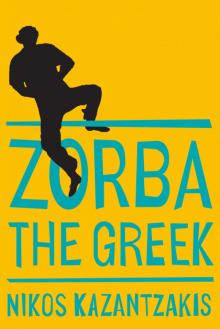Read Zorba the Greek Storyline:
The book opens in a café in Piraeus, just before dawn on a gusty autumn morning in the 1930s. The narrator, a young Greek intellectual, resolves to set aside his books for a few months after being stung by the parting words of a friend, Stavridakis, who has left for the Russian Caucasus in order to help some Pontic Greeks (in that region often referred to as Caucasus Greeks) who are being persecuted. He sets off for Crete in order to re-open a disused lignite mine and immerse himself in the world of peasants and working-class people.He is about to begin reading his copy of Dante's Divine Comedy when he feels he is being watched; he turns around and sees a man of around sixty peering at him through the glass door. The man enters and immediately approaches him to ask for work. He claims expertise as a chef, a miner, and player of the santuri, or cimbalom, and introduces himself as Alexis Zorba, a Greek born inRomania. The narrator is fascinated by Zorba's lascivious opinions and expressive manner and decides to employ him as a foreman. On their way to Crete, they talk on a great number of subjects, and Zorba's soliloquies set the tone for a large part of the book.On arrival, they reject the hospitality of Anagnostis and Kondomanolious the café-owner, and on Zorba's suggestion make their way to Madame Hortense's hotel, which is nothing more than a row of old bathing-huts. They are forced by circumstances to share a bathing-hut. The narrator spends Sunday roaming the island, the landscape of which reminds him of "good prose, carefully ordered, sober… powerful and restrained" and reads Dante. On returning to the hotel for dinner, the pair invite Madame Hortense to their table and get her to talk about her past as a courtesan. Zorba gives her the pet-name "Bouboulina" and, with the help of his cimbalom, seduces her. The protagonist seethes in his room while listening to the sounds of their impassioned lovemaking.The next day, the mine opens and work begins. The narrator, who has socialist ideals, attempts to get to know the workers, but Zorba warns him to keep his distance: "Man is a brute.... If you're cruel to him, he respects and fears you. If you're kind to him, he plucks your eyes out." Zorba himself plunges into the work, which is characteristic of his overall attitude, which is one of being absorbed in whatever one is doing or whomever one is with at that moment. Quite frequently Zorba works long hours and requests not to be interrupted while working. The narrator and Zorba have a great many lengthy conversations, about a variety of things, from life to religion, each other's past and how they came to be where they are now, and the narrator learns a great deal about humanity from Zorba that he otherwise had not gleaned from his life of books and paper.The narrator absorbs a new zest for life from his experiences with Zorba and the other people around him, but reversal and tragedy mark his stay on Crete, and, alienated by their harshness and amorality, he eventually returns to the mainland once his and Zorba's ventures are completely financially spent. Having overcome one of his own demons (such as his internal "no," which the narrator equates with the Buddha, whose teachings he has been studying and about whom he has been writing for much of the narrative, and who he also equates with "the void") and having a sense that he is needed elsewhere (near the end of the novel, the narrator has a premonition of the death of his old friend Stavridakis, which plays a role in the timing of his departure to the mainland), the narrator takes his leave of Zorba for the mainland, which, despite the lack of any major outward burst of emotionality, is significantly emotionally wrenching for both Zorba and the narrator. It almost goes without saying that the two (the narrator and Zorba) will remember each other for the duration of their natural lives.Pages of Zorba the Greek :
